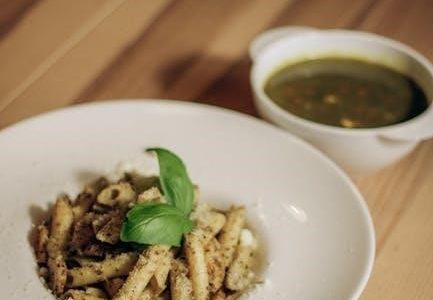A well-structured vegetarian bodybuilding meal plan focuses on plant-based, protein-rich foods to support muscle growth and recovery. It includes meals like tofu stir-fry, lentil soup, and quinoa bowls, ensuring balanced nutrition while aligning with fitness goals. These plans are customizable, offering flexibility and variety to suit individual needs. With careful planning, vegetarians can achieve their bodybuilding objectives while embracing a sustainable, ethical lifestyle.
1.1 What is a Vegetarian Bodybuilding Meal Plan?
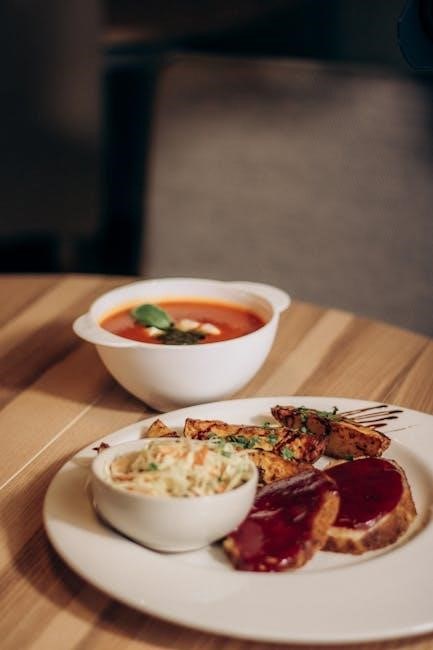
A vegetarian bodybuilding meal plan is a structured diet designed to support muscle growth and recovery while adhering to plant-based principles. It focuses on nutrient-dense foods, including high-protein options like tofu, legumes, and quinoa, along with complex carbohydrates and healthy fats. The plan is tailored to meet the specific caloric and macronutrient needs of bodybuilders, ensuring adequate protein intake for muscle synthesis. It emphasizes meal frequency and timing to optimize performance and recovery. By incorporating a variety of flavors and textures, the plan makes it easier to stay consistent and enjoy the journey. This approach aligns with ethical and environmental values, offering a sustainable path to achieving bodybuilding goals.
1.2 Importance of Meal Planning for Bodybuilding
Meal planning is crucial for bodybuilding success, especially for vegetarians, as it ensures adequate protein intake and balanced nutrition. A well-structured plan helps meet caloric and macronutrient needs, supporting muscle growth and recovery. Without proper planning, it can be challenging to consume enough protein and essential nutrients, potentially hindering progress. Meal planning also promotes consistency, which is key for achieving bodybuilding goals. By organizing meals in advance, individuals can avoid nutritional deficiencies and stay on track with their fitness objectives. Additionally, a planned diet aligns with ethical and environmental values, making it a sustainable choice for those committed to plant-based bodybuilding.

Understanding the Basics of Vegetarian Bodybuilding
Vegetarian bodybuilding focuses on plant-based nutrition to build and maintain muscle. It emphasizes protein-rich foods like legumes, tofu, and quinoa, ensuring sufficient intake for muscle growth. Proper planning is essential to meet nutritional needs, aligning with ethical and environmental values. This approach promotes a sustainable lifestyle while supporting fitness goals.
2.1 Key Considerations for Vegetarian Bodybuilders
When designing a vegetarian bodybuilding meal plan, it’s crucial to focus on protein intake, calorie needs, and macronutrient balance. Plant-based protein sources like legumes, tofu, and quinoa are essential for muscle growth. Ensuring adequate calorie consumption is vital to support energy and recovery. Additionally, tracking macronutrients helps maintain the right balance of carbs, proteins, and fats. Supplements, such as protein powders and vitamin B12, can fill nutritional gaps. Staying hydrated and timing meals around workouts are also important. A well-structured plan ensures sustainability and aligns with ethical and environmental values. By carefully planning, vegetarians can achieve their bodybuilding goals effectively. Proper nutrition and consistency are key to success in this journey.
2.2 The Role of Protein in Vegetarian Bodybuilding
Protein is essential for muscle repair and growth, making it a cornerstone of vegetarian bodybuilding. Plant-based sources like lentils, chickpeas, tofu, tempeh, seitan, and quinoa provide ample protein. Aim for 1.6-2.2g of protein per kilogram of body weight daily. Incorporating protein-rich meals such as lentil soup, tofu stir-fry, or a protein shake with 46g of protein can meet these needs. Balancing protein intake across meals ensures sustained muscle synthesis. Supplements like pea or hemp protein powders can also support goals. Prioritizing whole, nutrient-dense foods helps maintain overall health while fueling muscle growth. Consistent protein intake is vital for achieving and maintaining a strong, lean physique on a vegetarian diet.
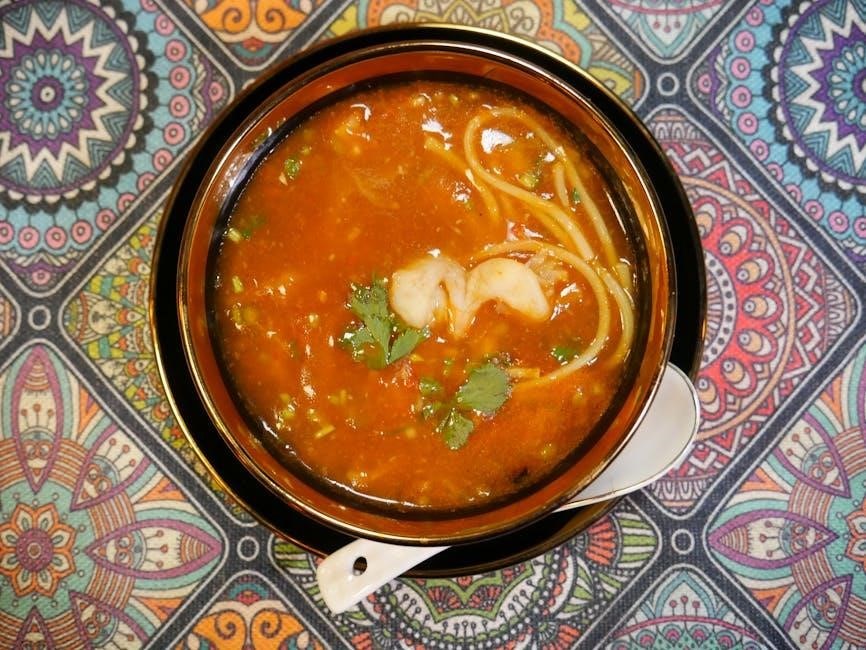
Benefits of a Vegetarian Bodybuilding Diet
A vegetarian bodybuilding diet promotes improved health, supports muscle growth, and aligns with environmental and ethical values. It fosters a sustainable lifestyle while enhancing overall well-being and performance.
3.1 Improved Health and Well-being
A vegetarian bodybuilding meal plan emphasizes nutrient-dense, plant-based foods, which are rich in vitamins, minerals, and antioxidants. This diet reduces inflammation, enhances heart health, and lowers the risk of chronic diseases. By focusing on whole foods like legumes, grains, and vegetables, individuals can maintain a balanced intake of essential nutrients. The high fiber content supports digestion and satiety, while the absence of saturated animal fats contributes to better overall well-being. Additionally, a plant-based diet promotes sustainable energy levels and mental clarity, making it ideal for bodybuilders seeking to optimize their health while building muscle. This approach not only fuels physical performance but also supports long-term wellness.
3.2 Environmental Impact of a Plant-Based Diet
Adopting a plant-based diet significantly reduces your environmental footprint. Animal agriculture is a major contributor to greenhouse gas emissions, deforestation, and water pollution. By choosing plant-based meals, you lower your carbon footprint and support sustainable agriculture. A vegetarian bodybuilding meal plan promotes eco-friendly food choices, such as legumes, grains, and vegetables, which require fewer resources to produce. This diet also reduces land use, as plant-based foods are generally more efficient to cultivate. By aligning your nutrition with environmental values, you contribute to a healthier planet while achieving your fitness goals. This sustainable approach makes vegetarian bodybuilding a responsible choice for both personal and global well-being.
Designing Your Vegetarian Bodybuilding Meal Plan
A well-crafted vegetarian bodybuilding meal plan focuses on protein-rich, nutrient-dense foods to fuel muscle growth and recovery. It includes balanced meals like tofu stir-fry, lentil soup, and quinoa bowls, ensuring optimal nutrition for bodybuilding goals. With careful planning, you can create a diet that supports muscle development while aligning with plant-based values. This approach provides the necessary tools to achieve fitness objectives effectively.
4;1 Calculating Daily Caloric Needs
Calculating daily caloric needs is crucial for a successful vegetarian bodybuilding meal plan. This step ensures you consume enough energy to support muscle growth and recovery while avoiding excess that could hinder progress. Factors like age, weight, height, activity level, and bodybuilding goals (bulking or cutting) are considered. A common method is using the Harris-Benedict equation to estimate basal metabolic rate (BMR) and then adjusting for activity level. For bulking, aim for a caloric surplus of 250-500 calories above maintenance, while cutting requires a deficit. Tracking macros and adjusting calories based on progress ensures optimal results. This personalized approach helps tailor the meal plan to individual needs, making it more effective for achieving fitness objectives.
4.2 Balancing Macronutrients for Optimal Performance
Balancing macronutrients is essential for a vegetarian bodybuilding meal plan to ensure optimal performance and muscle growth. Protein intake should be prioritized, with 1.2-2.2 grams per kilogram of body weight daily, sourced from legumes, tofu, and plant-based proteins. Carbohydrates, such as whole grains, quinoa, and sweet potatoes, provide energy for workouts and recovery. Healthy fats, including avocados, nuts, and seeds, support hormone production and overall health. A balanced ratio of 25-30% protein, 40-50% carbohydrates, and 20-30% fats is recommended. Tailoring macronutrient ratios to individual goals, whether bulking or cutting, ensures maximum results. Proper balance prevents nutrient deficiencies and enhances physical performance, making it a cornerstone of a successful vegetarian bodybuilding diet.
4.3 Importance of Meal Frequency and Timing
Meal frequency and timing play a crucial role in a vegetarian bodybuilding meal plan to maximize muscle growth and recovery. Consuming 5-6 smaller meals throughout the day helps maintain steady energy levels and supports muscle synthesis. Timing meals around workouts is key, with a protein-rich meal or shake 1-2 hours before training and a post-workout meal within 30-60 minutes to replenish glycogen and repair muscles. Spacing meals evenly ensures consistent nutrient availability, preventing muscle breakdown. Additionally, incorporating snacks like nuts or fruit between meals maintains metabolic activity. Proper timing enhances absorption of nutrients, optimizing performance and recovery, making it a vital component of a successful vegetarian bodybuilding diet.
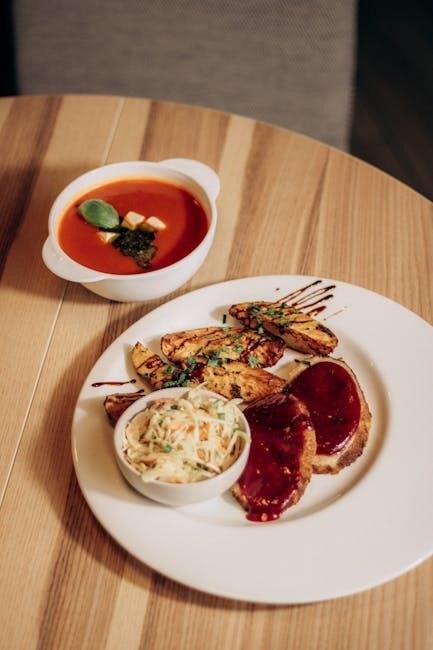
Essential Foods for a Vegetarian Bodybuilding Diet
A vegetarian bodybuilding diet relies on protein-rich foods like tofu, lentils, quinoa, and chickpeas. Whole grains, nuts, and seeds provide sustained energy, while avocados and olive oil offer healthy fats.
5.1 High-Protein Plant-Based Foods
For a vegetarian bodybuilding diet, high-protein plant-based foods are essential. Tofu, lentils, quinoa, chickpeas, and black beans are excellent sources of protein, providing the amino acids needed for muscle repair and growth. Incorporating a variety of legumes, whole grains, and nuts ensures a balanced intake of essential nutrients. Tempeh, seitan, and edamame are also great options, offering both protein and texture to meals. Spirulina and hemp seeds are additional high-protein choices that can be easily added to smoothies or salads. These foods not only support muscle development but also promote overall health, making them cornerstone elements of a successful vegetarian bodybuilding meal plan.
5.2 Incorporating Whole Grains and Complex Carbohydrates
Whole grains and complex carbohydrates are vital for sustained energy and muscle recovery in a vegetarian bodybuilding diet. Foods like brown rice, quinoa, oats, and whole wheat provide steady glucose release, fueling workouts and aiding muscle repair. Incorporating whole grain bread, pasta, and barley ensures a rich supply of fiber, vitamins, and minerals. These carbs also support muscle function and recovery, making them a cornerstone of a balanced meal plan. Including complex carbs in meals like oatmeal, quinoa bowls, or whole grain wraps helps maintain energy levels and supports overall performance. They are essential for building and maintaining muscle mass while adhering to a plant-based lifestyle.
5.3 Healthy Fats for Sustained Energy
Healthy fats are essential for sustained energy and overall health in a vegetarian bodybuilding diet. Foods like avocados, nuts, seeds, and olive oil provide omega-3 and omega-6 fatty acids, which support hormone production and nutrient absorption. Incorporating these fats helps maintain energy levels during intense workouts and aids in muscle recovery. Avocados are particularly beneficial, offering monounsaturated fats that promote heart health. Nuts and seeds, such as almonds, chia seeds, and flaxseeds, are rich in healthy fats and can be easily added to meals or smoothies. Olive oil is another excellent source, ideal for dressings or cooking. Including these fats ensures a balanced diet and supports long-term energy and performance.
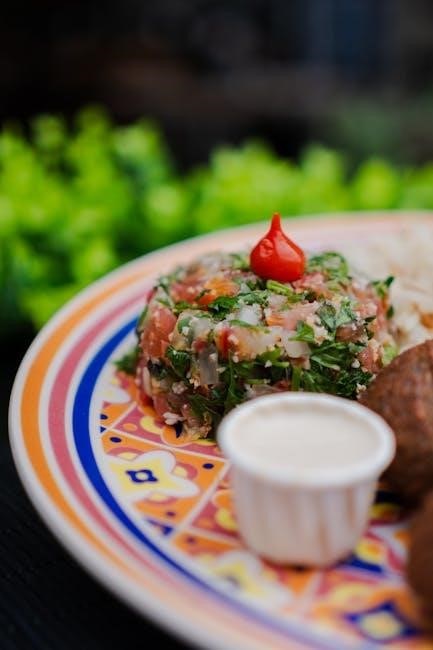
Supplements for Vegetarian Bodybuilders
Supplements are crucial for filling nutritional gaps in a vegetarian diet. Protein powders, vitamin B12, and iron/zinc supplements support muscle growth, energy, and overall health.
6.1 The Role of Protein Powders
Protein powders are a cornerstone of a vegetarian bodybuilding meal plan, especially for vegans, as they provide concentrated protein essential for muscle growth and recovery. Plant-based options like pea, hemp, and brown rice protein are popular choices, offering high bioavailability and minimal allergens. These supplements are particularly useful for meeting daily protein goals when whole food sources are insufficient. They also support post-workout recovery, helping to repair and build muscle tissue efficiently. With a variety of flavors and formulations available, protein powders offer convenience and flexibility, making them a must-have for vegetarian bodybuilders aiming to optimize their nutrition and training results.
6.2 Importance of Vitamin B12 Supplementation
Vitamin B12 is essential for energy production, nerve function, and red blood cell formation, making it a critical supplement for vegetarian bodybuilders. Since B12 is primarily found in animal products, vegetarians often require supplementation to meet their needs. A deficiency can lead to fatigue, muscle weakness, and poor recovery, hindering bodybuilding progress. B12 also plays a role in metabolism and immune function, further emphasizing its importance. Plant-based sources are limited, so supplementation is vital to ensure optimal performance and overall health. Consulting a healthcare professional for proper dosing is recommended to avoid deficiencies and support muscle growth effectively.
6.3 Managing Iron and Zinc Intake
Iron and zinc are essential minerals for bodybuilders, supporting immune function, muscle repair, and energy production. Vegetarians often face challenges obtaining sufficient iron and zinc due to their limited dietary sources. Plant-based iron sources include lentils, spinach, and beans, but their absorption can be inhibited by phytates and oxalates. Pairing iron-rich foods with vitamin C can enhance absorption. Zinc, found in nuts, seeds, and whole grains, is also critical for hormone regulation and recovery. Vegetarian bodybuilders may require supplementation to meet daily needs, especially if dietary intake is insufficient. Regularly monitoring levels and consulting a healthcare professional can ensure optimal performance and overall health. Proper management of these minerals is vital for sustained muscle growth and recovery.
Sample 7-Day Vegetarian Bodybuilding Meal Plan
A structured 7-day vegetarian bodybuilding meal plan offers a variety of high-protein, balanced meals to support muscle growth and recovery, ensuring nutritional needs are met daily.
7.1 Day 1: High-Protein Meals
Day 1 focuses on high-protein meals to kickstart your muscle-building journey. Begin with a tofu stir-fry for breakfast, packed with plant-based protein and colorful vegetables. Mid-morning, enjoy a protein smoothie made with pea protein powder, spinach, and almond milk. For lunch, opt for a lentil soup with a side of quinoa, ensuring a balanced mix of protein and complex carbs. In the afternoon, snack on edamame or a handful of mixed nuts. Dinner features a chickpea and avocado salad, rich in protein and healthy fats. End the day with an optional vegan protein bar or a bowl of oatmeal with nut butter for sustained energy. This plan ensures ample protein intake to support muscle growth and recovery.
7.2 Day 2: Balanced Macronutrient Intake
Day 2 emphasizes a balanced intake of macronutrients to fuel your workouts and support recovery. Start with oatmeal topped with almond butter and fresh berries for a mix of carbs and healthy fats. Mid-morning, have a protein smoothie with spinach, banana, and pea protein powder. Lunch includes a lentil and vegetable stir-fry served over brown rice, providing protein and complex carbs; Snack on mixed nuts and an apple for a boost of fats and fiber. Dinner features a chickpea curry with quinoa and steamed broccoli, ensuring a balanced mix of protein, carbs, and vitamins. End the day with a vegan yogurt topped with chia seeds and berries for sustained energy and recovery. This plan ensures a well-rounded intake of nutrients.

7.3 Day 3: Incorporating Variety and Flavor
Day 3 focuses on adding variety and flavor to keep your diet engaging while maintaining nutritional balance. Start with a tofu scramble mixed with spinach, bell peppers, and turmeric, served with whole-grain toast. Mid-morning, enjoy a mixed berry smoothie blended with almond milk and chia seeds. Lunch features a grilled vegetable wrap with hummus, quinoa, and avocado, providing a mix of protein and healthy fats. Snack on roasted chickpeas seasoned with herbs for a crunchy treat. Dinner includes a vegetable curry with chickpeas and brown rice, offering a rich blend of flavors and nutrients. End the day with a dark chocolate square and a handful of berries for a satisfying finish. This day highlights diverse flavors and textures to keep your meals exciting.
Tips for Success on a Vegetarian Bodybuilding Diet
Consistency is key—stick to your meal plan and track progress regularly. Stay organized, prep meals in advance, and ensure you’re meeting your daily nutritional goals.
8.1 Staying Consistent with Your Meal Plan
Consistency is the cornerstone of success in a vegetarian bodybuilding diet. To maintain momentum, plan and prep your meals weekly, ensuring you have all necessary ingredients. Use a vegetarian bodybuilding meal plan PDF as a guide to stay organized and track your progress. Avoid deviations by keeping healthy snacks on hand and staying hydrated. Meal prepping can save time and prevent impulsive food choices. Additionally, tracking your intake with a food diary or app helps maintain accountability. Celebrate small victories to stay motivated, and remember, consistency breeds results. By adhering to your plan, you’ll build muscle, enhance performance, and embrace a healthier lifestyle. Stay committed, and let your dedication fuel your journey.
8.2 Tracking Progress and Adjusting Your Diet
Tracking your progress is essential for optimizing your vegetarian bodybuilding meal plan. Use a food diary or mobile app to monitor your daily intake, ensuring you meet your macronutrient goals. Regularly weigh yourself and measure body fat to assess muscle growth. Adjust your caloric intake based on progress, increasing or decreasing as needed. Pay attention to recovery and energy levels, as these indicate whether your diet is supporting your training. If progress stalls, consider consulting a nutritionist to fine-tune your plan. Stay flexible and open to changes, ensuring your diet evolves with your fitness goals. By continuously monitoring and adapting, you’ll maximize results and maintain a balanced, effective vegetarian bodybuilding diet.

